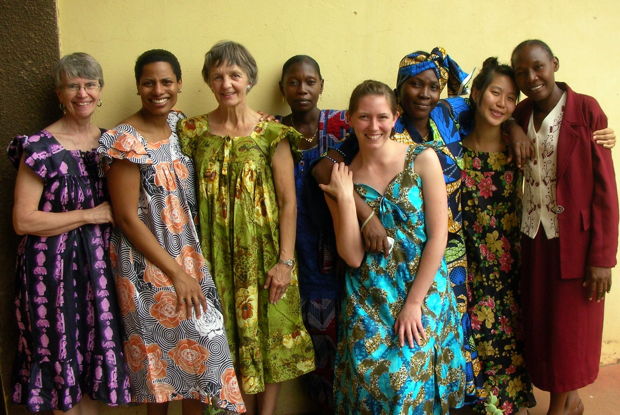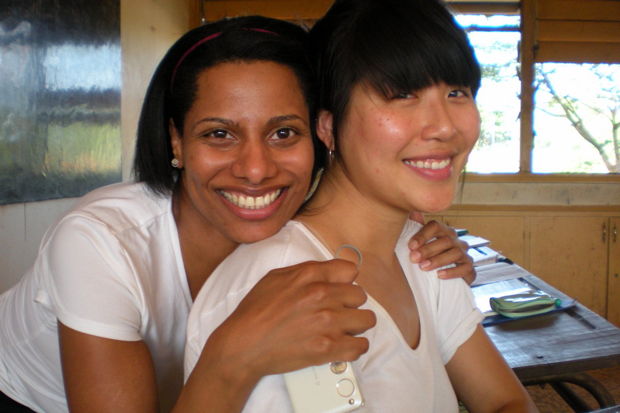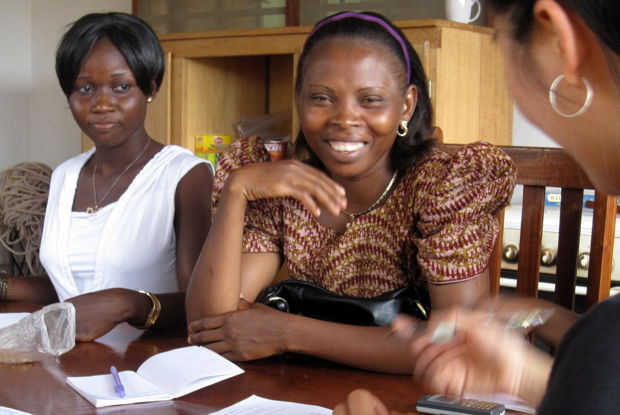June 11-25, 2009, Sally Ivaska, on staff with InterVarsity’s Women in the Academy & Professions, led a group of five women from a variety of disciplines, ethnicities, denominations, and ages, to the Central African Republic (CAR). They came at the invitation of the University of Bangui to help discover reasons why girls fail to continue their education beyond primary school. The team’s work included
- developing and fine-tuning a survey to get at this question
- participating in a gender issues workshop with women professors and students from the university
- interviewing women, including three government ministers, about their educational experience
- conducting English conversation classes for undergraduate women
- leading a workshop for 40 women from the IFES (L’Union des Jeunes Chrétiens, sister movement to InterVarsity) on the topic “Being a Woman Who Follows Jesus.”
The Well interviewed several of the participants for this report:

Photo: The team with new friends from the CAR. Sally is at the far left, next to Vicky. Lily stands second from the right, and Kate is crouching down in front.
Why did you go?
Kate (PhD student in musicology): This past year, as I was studying for my qualifying exams which I took in May, I was frustrated that my studies were going to be very isolating and very focused on myself and my own knowledge. I think of my calling as teaching, not just accumulating knowledge for myself, although I know exams will prepare me for that call. But I was looking for a way to focus on serving others after this period of studying, and had also been thinking about women’s health in developing countries. I came to see education as one of the most important areas for impact on women’s health. So I had these two interests at the time and then I got an email about this IV team. It fit what I was interested in and where I think my gifting is.
Lily (master’s student in architecture): At the Following Christ conference, I met Sally and heard about the trip, and prayed with Sally. I’d previously been on a missions trip to New Orleans that was life-changing. I was considering taking some time off school and come summer, everything kind of fit, and I ended up in Africa. When I began this trip, I think I was really trying to consolidate my faith, in terms of what it looked like to be a woman after God. Because I didn’t come from a strong Christian family, I wanted to learn how to be a stronger Christian. I was curious what other women’s faith looked like day-to-day and how they reconcile issues of vocation and faith. I thought this would be a good place to see this.
Vicki (Harvard Management Fellow): I was drawn to the project by the opportunity to be part of a project focused on women in the developing world. My family and I immigrated to the United States from the Dominican Republic and my parents believed that with faith in God, a strong work ethic, a college education, and my mother’s home cooking, their children could obtain access to opportunities that they never had. I have benefited greatly from people who poured into me and feel strongly that education and mentoring made all the difference in my life. I wanted to be part of a project that could potentially make a difference in the lives of young women and by extension an entire country.

Photo: Vicki with girls from church.
What challenges did you have?
Kate: The most difficult thing and the biggest hardship for me was simply the communication problems because of the language barrier. Another challenge was the formality and the importance of hierarchy in that culture, especially in the first few days when we were meeting with government officials and the administration of the university. These meetings really tested my patience.
Sally: Well, first of all, not a day went as planned! And it is very difficult to measure the outcome. One positive result of our time there — especially due to the openness of the team members — was the opportunity for African women to see and interact with these highly educated women from the United States who wanted to take the time to get to know them. Relationships are so highly valued in this African culture. The language barrier was huge but the women really worked hard to connect.
Lily: When I came, I felt inexperienced and unsure of myself. I didn’t feel totally comfortable and I was concerned I wouldn’t fit in. But God taught me, “Why are you looking for affirmation from anyone else but me? You’re a child of mine.” And the team was so great. It was really incredible to be with a group of women, with such differences, to pray together. I learned a lot about the disciplines of the spiritual life but definitely was reminded that everyone is different and we are all children of God.
Vicki: One of the biggest challenges I had was the importance of protocol and the status of women as second-class citizens. In some situations it felt like we (the women) were second-class citizens and that our project was an afterthought. However, I know that God taught us a lot about flexibility, humility, and patience. Despite the cultural challenges, I know that we made a lasting impact in the lives of women in the Central African Republic.

Photo: Vicki and Lily.
What do you think was accomplished by the team?
Kate: I think our purpose was primarily to be a catalyst, to help the faculty do the work. The burden was on them, getting people together to work on that project. We also got women together to talk about these problems, women faculty and women students together sharing their stories. The Saturday morning conference on gender, bringing all these women together to share their stories in one room, was a really important thing. From that, they expressed interest in forming a group of women academics to get together regularly.
Sally: I think the nature of our team, the diversity of it, had an impact on the people we were with, both Africans and the missionaries we were with. We had so many differences, but we were a unified team.
Kate: I did come to realize that it was important that we were there. It showed that we cared about this work. A long plane trip, a lot of money was invested and they were definitely grateful that we came for that particular project. And our presence, along with the work of the committee, brought the concerns to the attention of the whole university. Seraphin, one of the staff who hosted us, told Vicki and me on the last day that our presence and encouragement were really important for the women students we met. That has really stuck with me.
Lily: I think it really helps the people that are there that we are just present, that we have not given up on them. One of the missionaries, Sue Peters, said to me something I will never forget: “When you come here, you may not be the most useful person here. You may though be the only Bible these people will ever read and that is why you’re here.”
Kate: Sally gave a presentation about the woman who touched Jesus (Mark 5) to 40 women of IFES. The women there seemed so hungry to hear our thoughts on how to be women who follow Jesus, what is particular about that. Later, student leaders from the IFES group came and talked to Sally about how they can encourage women (students and wives of students) to have the courage to talk in their Bible studies. They clearly longed to be ministered to.
Lily: It is not so much about the work but about how you do the work while you’re here. It is really hopeful for me that we can cross oceans and in a matter of weeks we can make bonds and communicate as a woman and as a Christian. This to me testifies to our capacity to love.
Vicki: We were able to influence the way that some people in the Central African Republic view Americans and in particular, Christians. It was amazing to interact with women at the University of Bangui and to learn about their successes and challenges. It was rewarding to see how little by little the women at the University took charge of the project and made it their own. It was a pleasure and a blessing to be part of a women’s team that allowed each member to leverage their unique gifts.

Photo: Women in Lily’s class.
What benefits did you receive from the trip?
Kate: It was certainly valuable for me. When you do a short term mission trip, you have to approach it with the idea that you will probably be impacted a lot more than the people you go to serve. And you cannot expect to get a lot done in two weeks! It was so important to me to meet with other Christians and hear how they struggle and how they triumph in their situations. For me particularly, it was a great joy to learn how God’s people in Bangui use music to worship him.
Lily: It was really wonderful — the range of women, the other people that we met along the way, missionaries, teachers, and other teams that were serving with us — all brought a rich experience of stories. I saw how other people came to Christ and that you don’t need to find someone who has the same story; we all have different stories and we all need to go to God.
Kate: The trip taught me a lot about prayer. We asked the minister of tourism what she thought the unique contribution of women in government was — she may have understood us to say the place of women in society — but her answer was prayer — that the women pray whenever there is any kind of crisis. That was really remarkable for me to hear. This encouraged my own prayer life. It was also really helpful to be there to receive prayer requests. Just to understand better what their struggles and hopes are. It was so valuable to be there to meet people who care so deeply about their country and know that their hope is in Christ and that the strength of the church will determine whether the country will be successful.
Lily: I experienced ideas of generosity and hospitality that were just amazing! They blew my mind, gave me a sense of joy, how to include others in my life — how beneficial that was to me. It was really great. I’m amazed at a couple of girls who still email me, my friends, students there, who send me pictures of their children — it’s great!
Vicki: Participating in the CAR Women’s Global Project was God’s will and it was an absolute blessing to work with Sally, Nancy, Kate, and Lily. God had plans for my life that transcended the work we did while we were there. I feel blessed to have been part of the project. I learned about international development work, teamwork, and diplomacy. I was inspired by some of the people we worked with and the work God is doing in the CAR. I will continue to pray for the government, business and church leaders in the CAR. Personally, I also learned that I have a lot more work to do to become the woman that God wants me to be. I’m humbled by what God has done in my life and what he is getting ready to do through me. I am so thankful to have been able to participate in the women’s project and have the opportunity to experience God in a global way.